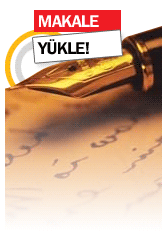




 Şaban Karaköse
|
Şaban Karaköse
Stories from the Mathnawí-e Sharif (1)
The story of the Sultan's falling in love with a handmaiden
O my friends! Hearken to this tale: in truth it is the very marrow of our inward state.
In olden time there was a Sultan to whom belonged the power temporal and also the power spiritual. It chanced that one day he rode with his courtiers to the chase. On the sultan's highway the sultan espied a handmaiden: the soul of the sultan was enthralled by her. Forasmuch as the bird, his soul, was fluttering in its cage, he gave money and bought the handmaiden.
After he had bought her and won to his desire, by Divine destiny she sickened. The Sultan gathered the physicians together from left and right and said to them, The life of us both is in your hands. My life is of no account, (but) she is the life of my life. I am in pain and wounded: she is my remedy. Whoever heals her that is my life will bear away with him my treasure and pearls, large and small.
They all answered him, saying, We will hazard our lives and summon all our intelligence and put it into the common stock. Each one of us is the Messiah of a world (of people): in our hands is a medicine for every pain. In their arrogance they did not say, If God will; therefore God showed unto them the weakness of
The sick girl became (thin) as a hair, (while) the eyes of the king flowed with tears of blood, like a river. When the Sultan saw the powerlessness of those physicians, he ran bare-footed to the mosque. He entered the mosque and advanced to the mihráb (to pray): the prayer-carpet was bathed in the king's tears. On coming to himself out of the flood of ecstasy (faná) he opened his lips in goodly praise and laud, Saying, O Thou whose least gift is the empire of the world, what shall I say, in as much as Thou knowest the hidden thing? O Thou with whom we always take refuge in our need, once again we have missed the way. But Thou hast said, 'Albeit I know thy secret, nevertheless declare it forthwith in thine outward act.' When from the depths of his soul he raised a cry (of supplication), the
When the promised hour arrived and day broke and the sun, (rising) from the east, began to burn the stars, The Sultan was in the belvedere, expecting to see that which had been shown mysteriously. He saw a person excellent and worshipful, a sun amidst a shadow, Coming from afar, like the new moon (in slenderness and radiance): he was nonexistent, though existent in the form of phantasy. In the countenance of the stranger-guest was appearing that phantasy which the Sultan beheld in his dream. The Sultan himself, instead of the chamberlains, went forward to meet his guest from the Invisible. He (the Sultan) opened his hands and clasped him to his breast and received him, like love, into his heart and soul, And began to kiss his hand and brow and inquire concerning his home and journey.
He rehearsed the tale of the invalid and her illness, and then seated him beside the sick (girl). The physician observed the colour of her face, (felt) her pulse, and (inspected) her urine; he heard both the symptoms and the (secondary) causes of her malady.
He said, None of the remedies which they have applied builds up (health): they (the false physicians) have wrought destruction. He saw the pain, and the secret became open to him, but he concealed it and did not tell the king. Her pain was not from black or yellow bile: the smell of every firewood appears from the smoke. From her sore grief he perceived that she was heart-sore; well in body, but stricken in heart. Being in love is made manifest by soreness of heart: there is no sickness like heartsickness. He said: O king, make the house empty; send away both kinsfolk and strangers. Let no one listen in the entrance-halls, that I may ask certain things of this handmaiden.
The house was left empty, and not one inhabitant (remained): nobody save the physician and that sick girl. Very gently he said (to her), Where is thy native town? for the treatment suitable to the people of each town is separate. And in that town who is related to thee? With what hast thou kinship and affinity? He laid his hand on her pulse and put questions, one by one, about the injustice of Heaven. He listened to her story (while) he continued to observe her pulse and its beating, so that at whosoever's name her pulse should begin to throb, (he might know that) that person is the object of her soul's desire in the world. He counted up the friends in her native town; then he mentioned another town by name. He said: When you went forth from your own town, in which town did you live mostly? She mentioned the name of a certain town and from that too she passed on (to speak of another, and meanwhile) there was no change in the colour of her face or in her pulse. Masters and towns, one by one, she told of, and about dwelling-place and bread and salt. She told stories of many a town and many a house, (and still) no vein of her quivered nor did her cheek grow pale. Her pulse remained in its normal state, unimpaired, till he asked about Samarcand, the (city) sweet as candy.(Thereat) her pulse jumped and her face went red and pale (by turns), for she had been parted from a man of Samarcand, a goldsmith. When the physician found out this secret from the sick (girl), he discerned the source of that grief and woe. He said: Which is his quarter in passing (through the town)? Sar-i Pul (Bridgehead), she replied, and
Then he arose and went to see the Sultan and acquainted him with a portion of that matter. The (best) plan, said he, is that we should bring the man here for the sake of (curing) this malady. Summon the goldsmith from that far country; beguile him with gold and robes of honour. The king sent thither one or two messengers, clever men and competent and very just. To Samarcand came the two messengers for the goldsmith debonair and wanton, Saying, O fine master, perfect in knowledge, thou whose quality (of perfection in thy craft) is famous in (all) the lands, Lo, such-and-such a king hath chosen thee for (thy skill in) the goldsmith's craft, because thou art eminent. Look now, receive this robe of honour and gold and silver; when thou comest (to the Sultan), thou wilt be a favourite and boon-companion. The man saw the much wealth and the many robes: he was beguiled, he parted from his town and children. Blithely the man came into the road, unaware that the king had formed a design against his life. He mounted an Arab horse and sped on joyously: (what really was) the price of his blood he deemed a robe of honour.
When the stranger arrived (and turned) from the road, the physician brought him into the presence of the Sultan. Proudly and delicately they conducted him to the sultan of sultans, that he might burn (like a moth) on that candle of Tiráz. The Sultan beheld him, showed great regard (for him), and entrusted to him the treasure house (full) of gold.
Then the physician said to him: O mighty Sultan, give the handmaiden to this lord, In order that the handmaiden may be happy in union with him, and that the water of union with him may put out the fire (of passion). The king bestowed on him that moon-faced one and wedded those twain (who were) craving (each other's) company. During the space of six months they were satisfying their desire, till the girl was wholly restored to health.
Thereafter he prepared for him a potion, so that when he drank it he began to dwindle away before her. When because of sickness his beauty remained not, the soul of the girl remained not in his pestilence (deadly toils). Since he became ugly and ill-favoured and sallow-cheeked, little by little he became cold (irksome and unpleasing) in her heart. Those loves which are for the sake of a colour (outward beauty) are not love: in the end they are a disgrace. Would that he too had been disgrace (deformity) altogether, so that that evil judgement might not have come to pass upon him! Blood ran from his eye (that flowed with tears) like a river; his (handsome) face became the enemy of his life. The handmaiden was purged of pain and love.
EXPLANATIONS
1- The symbolism in this story
The Sultan: The Ruh which is blown into every human being (So, when I have proportioned him, completed him, and breathed, caused to flow, of My Spirit in him, so that he becomes a living thing the annexation of 'the Spirit' to him is a conferring of honour upon Adam fall down in prostration before him!', a prostration [meant as an act] of salutation by bowing. 15:29 The Holy Quran)
Handmaiden: Nafs (A; lit., "breath," "self"; spelling in T, nefs): In sufism this
refers to the sensual or bodily self, or ego. A major part of the spiritual work of sufism is in combatting and training the base self until it submits to the Divine Will and is pleasing to God. Ibrahim Gamard Mevlevi Terms and Definitions)
Goldsmith: World, worldly love
The physician: Murshid-i kâmil (murshid (A; lit., "one who guides"; spelling in T, mürSid, mürSit): A term in sufism, the sufi master and spiritual guide of a sufi disciple [murîd]. The sufi spiritual guide. Also called a sufi "(wise) elder": shaykh (A), pîr (P), or dede (T). Ibrahim Gamard Mevlevi Terms and Definitions)
The other physicians: Fake (imitator) Sheikhs
2- Allah Ta'ala has created Human beings to worship Him, to obey Him, to know Him and to love Him. (Surah Al Dhariyat- Ayat 56: I have only created jinns and men, that they may serve me). Allah (cc) wants His servants to love Him more than anything. In any case, the true love/ aşhk is the love of Allah. The other loves are temporary. Allah is jealous for His servants to love other than Him in case this love will spur them on to commit sins. If the servant (kul) gives his/her heart more deeply to anything other than Allah (Please look Surah Al-Baqarah, Ayat 165), then He will test them with trials in their worldly life to help them to better see the face of the object of their love and thereby to realize that the love that they sought is not the real love. In the Holy Qur'an, the following verse illustrates this point: Say: 'If your fathers, and your sons, and your brothers, and your wives, and your clan, your kinsmen ('ashīratukum: a variant reading has 'ashīrātukum), and the possessions which you have acquired, and merchandise for which you fear there may be no sale, no longer viable, and dwellings which you love, are dearer to you than God and His Messenger and struggling in His way, so that you have refrained from emigrating and struggling for the sake of such [things], then wait until God brings about His command this is meant as a threat to them. And God does not guide the wicked folk'.
3- Like the physician cures ailments of the body, Murshid-i kâmils cure the ailments of the heart, and help the people to reach the divine love.

Web sitemizin dışında farklı sitelere yönlendiren linklerin içeriklerinden
Semazen.net sorumlu tutulamaz.
Görsel Tasarım: Capitol Medya // Yazılım: CM Bilişim






